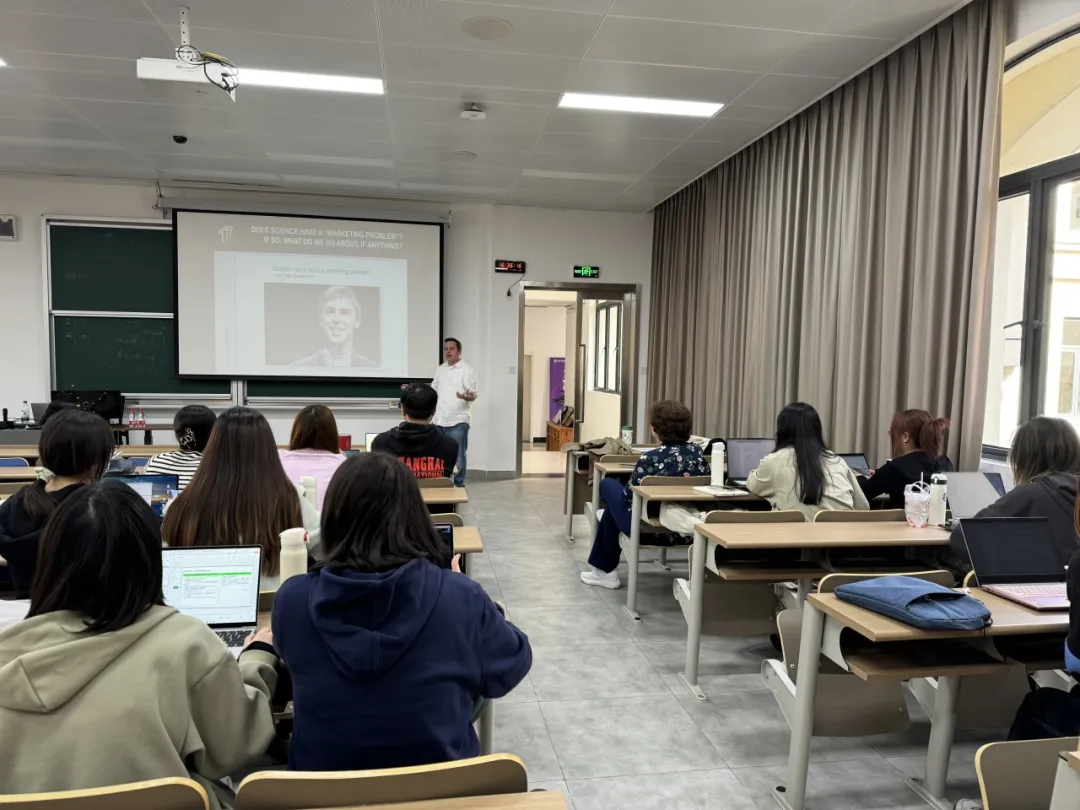
By Jia Shuai
Translated by Guo Yishun
On the afternoon of March 24, Dr. Michael A. Cacciatore, Associate Professor and Co-Director of Center for Health & Risk Communication from University of Georgia, delivered a lecture titled “A Science Communication Primer: Assumptions, Realities, Barriers & Opportunities” at School of Journalism and Communication at Shanghai International Studies University. The event, hosted by Professor Chen Peiqin of SJC, offered a comprehensive overview of the current state of science communication research, its persistent challenges, and emerging opportunities.
Dr. Cacciatore opened by critically examining common assumptions within the scientific community—particularly the belief that the mere presentation of facts is sufficient to foster public understanding and support for science. He argued that such an assumption overlooks the complex interplay of values, beliefs, and emotions that shape how individuals receive and interpret scientific information.
Drawing on a series of case studies, Dr. Cacciatore highlighted the limitations of the traditional “deficit model” of communication, which assumes that a lack of knowledge is the primary barrier to public acceptance. Instead, he emphasized the significance of psychological, cultural, and ideological factors in influencing public attitudes, particularly in contentious areas such as climate change and vaccination.
The lecture further explored the influential roles of media and politics in shaping scientific discourse. Dr. Cacciatore used the example of media coverage following the Fukushima nuclear disaster to illustrate how partisan outlets framed the issue differently, thereby reinforcing preexisting political ideologies. This, he noted, underscores how scientific information is often received not purely as neutral data, but as content filtered through ideological and emotional frameworks.
According to Dr. Cacciatore, effective science communication must go beyond the transmission of factual content. It should involve a respectful exchange of values and an appreciation of diverse worldviews, including religious, cultural, and political perspectives. He stressed the need for more inclusive and adaptive communication strategies that engage with audiences on both rational and emotional levels.
Despite the outlined challenges, Dr. Cacciatore expressed optimism about the future of the field. He proposed several forward-looking strategies, including value-based framing, emotional resonance, the strategic use of digital platforms, and the integration of interdisciplinary approaches. He also shared recent research conducted with colleagues, demonstrating how collaborative, cross-disciplinary efforts can enhance the reach and impact of science communication across varied sociocultural contexts.
In sum, the lecture offered critical insights into the evolving field of science communication, urging practitioners and scholars alike to rethink traditional models and embrace more holistic and inclusive approaches. As information ecosystems become increasingly complex, the need for thoughtful, research-informed communication strategies becomes ever more pressing.


 |Hongkou Campus|550 Dalian Road (W), Shanghai 200083, China |Songjiang Campus|1550 Wenxiang Road, Shanghai 201620, China
|Hongkou Campus|550 Dalian Road (W), Shanghai 200083, China |Songjiang Campus|1550 Wenxiang Road, Shanghai 201620, China